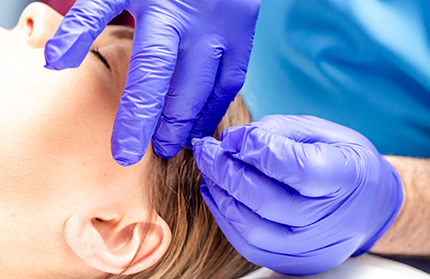Is Temporomandibular Joint Pain Causing My Headaches?
If you suffer from temporomandibular joint pain (TMJ), you may also experience a range of other symptoms as well as the pain in your jaw. While some of these problems may appear to be unrelated to your condition, they may in fact be temporomandibular joint dysfunction symptoms after all. Headaches, for example, are a very common side effect of TMJ, and many sufferers experience them on a regular basis.
Are Headaches Common Amongst TMJ Sufferers?
TMJ headaches are one of the most commonly seen TMJ syndromes. They may be directly caused by TMJ or may be secondary to the disorder. Typically, the headaches that occur alongside TMJ are dull, tight and aching headaches. Most commonly, the pain will occur on just one side of the head – usually the side on which TMJ is worse, but it may occur on both. This headache will be aggravated by movement of the haw, but with temporomandibular joint dysfunction relaxation techniques it can be relieved.
Can TMJ Cause Migraines?
Migraines are more sharp and throbbing than TMJ-related headaches. They are also associated with other symptoms that affect vision and sensation. Although TMJ can make it more likely for you to experience a migraine, they don’t cause them directly.
Why Do People With TMJ Experience Headaches?
People who suffer from TMJ syndromes are more likely to have headaches because the inflammation and swelling found in their temporomandibular joint can travel to other ligament and muscle tissues around the area of the jaw. When the inflammation spreads, the muscles start to become inflamed and tight and spasms occur. As a result, headaches can happen around the face, skull and even the neck. Also, some TMJ sufferers find that they experience headaches due to asymmetry in the alignment of their jaw which creates stress on the muscles and joint that causes tension headaches too.
Which Other Symptoms May Occur With TMJ?
Although headaches are quite common in TMJ sufferers, there are some other symptoms that sufferers often experience. These include:
• Tinnitus or ear pain
• Pain in the jaw
• Pain in the cheek
• Clicking jaw
• Difficulty when opening the mouth
• Lock jaw
• Neck pain
• Dizziness
• Teeth grinding
If you have received a diagnosis of TMJ, you may also experience some or all of the above symptoms in conjunction with your condition, any of which can cause ongoing issues in your everyday life.
Seeking Temporomandibular Joint Disorder Treatment
If you have been diagnosed with temporomandibular joint disorder or if you are experiencing the symptoms outlined above and believe you may be a sufferer, it’s important to seek out temporomandibular joint disorder treatment as quickly as possible to prevent further damage from occurring and to relieve your pain. RPI Therapy Services are on hand to give you the help that you need to improve your quality of life and to relieve your ongoing suffering due to TMJ.


